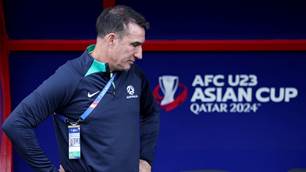The failure to qualify for the London Olympics has denied the nation's best
The failure of the Olyroos to qualify for the London Olympics has denied the nation's best young players vital international experience, with next year's inaugural Under-22 Asian Cup now taking on increasing importance.
For the first time since 1984 Australia will not take part in the Olympics. Whilst some have been quick to dismiss the games as a Mickey Mouse event Australia's struggles in qualification demonstrate the need to expose the best young players as often as possible to international football.
Many of the Olyroos have starred in the A-League but have been unable to replicate that form on the international stage. The reasons for this may vary but the obvious one is that the demands of international football differ greatly from those at club level.
Without the London Olympics to look forward to, the qualifying campaign for next year's Under-22 Asian Cup carries real significance. If Australia was to miss out a huge chunk of those who could be future Socceroos would have been denied important tournament experience.
As the Olympic Qualification campaign has demonstrated most Asian sides are far from a pushover and Australia been handed a difficult qualifying group, which includes Japan, Indonesia, Singapore, Macau and Timor Leste.
Eager to avoid a repeat of failing to qualify for the next Olympics coach Aurelio Vidmar may elect to use the qualifiers for the Cup, and the tournament if qualification is secured, as means of preparation for the next Olympic campaign.The logic of doing so has merit as it is essential that Australia's best young players are exposed to international football at the youngest possible age on a consistent basis. However, the future of the Socceroos must also be taken into consideration.
Many of the current Socceroos are nearing the end of their international careers and the Olyroos struggles highlight how the next generation is not yet ready to take their place. Next year's championships represent an opportunity to give them vital experience.
Those who might suggest the tournament offers little fail to take into account how many successful countries have benefited from good performances at age restricted championships. Spain's recent success on the senior international stage came after sustained success in youth championships as has Germany's. The opposite is true of England who has neglected many youth tournaments and the development of players for the senior side has suffered along with performances.
If Australia was to qualify and do well at the Under-22 Asian Cup it could prove to be a vital part of the Country's development pathway. Not only would they grow in confidence they would also feel more comfortable playing Asian opposition. With Australia's representation at future World Cups determined by results against Asian opposition the benefits are obvious. Weaknesses can also be exposed in the Nation's young players at a time when it is much easier to rectify them.
Australia must embrace all opportunities to test our players in the international arena; it is only then that we can get a glimpse into the future of the senior National Team and assess how the development pathway is performing.
As the failed Olympic campaign shows there is plenty of work to be done if next generation are to match the high standards of the current Socceroos or better them.
Follow me on Twitter @beaubusch
Related Articles

Campaign of pain: FA's Olyroos inquest will pile heat on Vidmar

Socceroos midfielder embraces move to England












